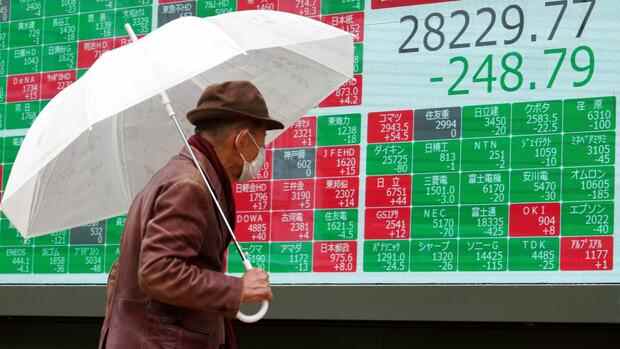The Asian stock exchanges lose significantly over the weekend.
(Photo: dpa)
Singapore, Hong Kong The Asian stock exchanges also fell on Friday, weighed down by the recent price losses on Wall Street. The Japanese Nikkei index fell by 1.3 percent to 28,124 points and the Shanghai stock exchange by one percent to 3,521 points.
“Expected rate hikes in the US are weighing on sentiment,” said Jun Morita, chief analyst at asset manager Chibagin. “Everyone is really nervous at the moment. That’s because everything could be squeezed by aggressive Fed policies,” said Kyle Rodda, a market analyst at IG in Melbourne.
In addition, investors feared economic impairments from the omicron variant of the corona virus. “So far, Japan has gotten through better than other countries, but now the number of infections is also starting to rise here.”
For China, the experts at HSBC Bank expected a key rate cut to cushion the economic slowdown caused by the renewed pandemic. Bucking the trend, Fast Retailing shares posted their biggest one-day gain in nearly two years, up 8.1 percent.
Top jobs of the day
Find the best jobs now and
be notified by email.
The Japanese mother of the fashion retailer Uniqlo surprisingly increased its quarterly operating profit by 5.6 percent to the equivalent of 915 million euros thanks to strong Christmas business. In addition, the company intends to pass on increased material and transport costs to its customers in the future.
Shares in struggling Chinese homebuilder Evergrande rose slightly by 0.6 percent on Friday shortly after a default was averted. The heavily indebted developer had received crucial approval from onshore bondholders on Thursday to defer payments on one of its bonds, according to Hengda Real Estate Group, the core company of Evergrande’s real estate division. However, their volume corresponds to only a fraction of the 300 billion dollars with which the real estate group is in debt to its mostly Chinese lenders.
A good 72 percent of investors voted in favor of granting the company a deferral of the equivalent of a good $700 million yuan bond, Hengda said. The company had asked for six months more time for the repayment in order to prevent immediate bankruptcy.
“The approval was expected, bondholders do not want to part with Evergrande now, hoping the issue can eventually be resolved,” said Kington Lin, managing director of asset management at Canfield Securities.
Evergrande is currently trying to raise cash by selling assets and shares to pay suppliers and creditors. The debt drama surrounding the industry giant, which has been dragging on for months, is increasing the pressure on the Beijing government to prevent a conflagration in the Chinese real estate and financial markets.
Chinese exports are growing faster than expected
Export world champion China achieved a record export surplus in 2021. Exports exceeded imports by 676.43 billion dollars (almost 590 billion euros), as announced by the customs authority in Beijing on Friday. That is a good 152 billion more than in 2020. It is also the highest value since statistics began in 1950.
The reason for this is the strong global demand for goods “Made in China”. These increased by 29.9 percent last year, after only an increase of 3.6 percent in the first year of Corona. For example, computers and other electronics that are required for working from home due to the pandemic were particularly in demand. Medical products such as masks were also in demand around the world because of the pandemic.
Chinese imports grew 30.1 percent after falling 1.1 percent in 2020.
China posted a trade surplus of $94.46 billion last month while the survey forecast a surplus of just $74.50 billion.
In Asian currency trading, the dollar fell 0.3 percent to 113.79 yen and stagnated at 6.3603 yuan. Against the Swiss currency, it was 0.1 percent lower at CHF 0.9101. At the same time, the euro rose 0.1 percent to $1.1469. Sterling gained 0.1 percent to $1.3724.
More: Opportunity to enter China’s stock market? How fund managers assess the situation
